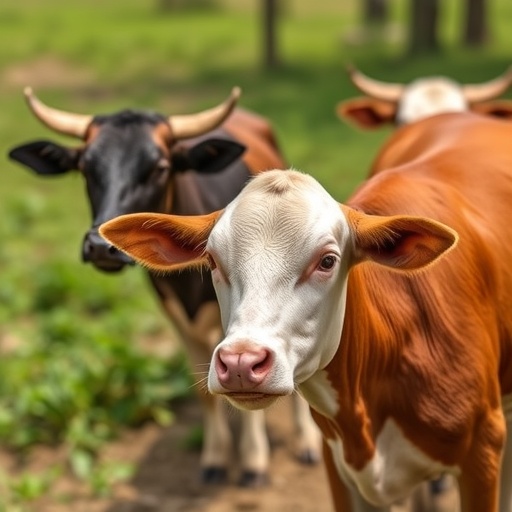In a quest to revolutionize the meat production sector within Ethiopia, a recent study highlighted the complexities associated with enhancing meat quality across the country’s livestock chain. Ethiopia, renowned for its rich agricultural history, possesses a significant livestock population, yet the meat industry faces numerous challenges that undermine its growth potential and the welfare of its livestock. The researchers, Muleta and Dida, reveal substantial concerns surrounding meat quality and strategize effective measures to bridge existing gaps.
One of the critical challenges identified in the Ethiopian livestock chain is the suboptimal nutritional management for livestock. This encompasses factors such as inadequate access to quality feed, which directly impacts the health and growth of animals. The study elaborates that many producers distribute low-quality feed and supplements, leading to stunted growth and unhealthy livestock. Furthermore, a lack of knowledge about proper animal husbandry practices exacerbates the problem, making it vital to educate farmers about high-quality feeding regimes that promote healthier livestock.
Another significant issue affecting meat quality is the limited veterinary services available to livestock farmers. Accessibility to veterinary care is essential for cattle health management, as diseases often hinder growth performance and meat quality. According to the research, many rural areas lack proper healthcare facilities, and even when available, the cost of veterinary services can be prohibitively high for smallholder farmers. The authors stress that enhancing veterinary service access is crucial in ensuring livestock health, which directly translates to improved meat quality.
Additionally, the research emphasizes the importance of slaughtering facilities and post-harvest processing in maintaining meat quality. In Ethiopia, inadequate and unhygienic slaughterhouses contribute significantly to meat spoilage, creating gaps in safety and quality standards. The researchers argue that investing in modern slaughterhouses equipped with essential facilities will help uphold stringent health and safety standards. They recommend the establishment of regulations to ensure adherence to meat quality standards, thereby elevating the overall industry profile.
Moreover, the study underscores the significance of value chain integration in the livestock sector. The current fragmentation within the meat production process leads to inefficiencies that negatively impact meat quality. Integration of various stakeholders, from feed producers to processors and retailers, can streamline operations and ensure better management practices. Additionally, establishing cooperatives among farmers could improve bargaining power when sourcing better feed, healthcare, and technology.
Consumer preferences and market demand also play a crucial role in shaping meat quality in Ethiopia. The researchers reveal a growing consumer awareness about the importance of meat quality, leading to shifts in purchasing decisions. Higher demand for premium-quality meat presents an opportunity for producers who are willing to adopt better practices. Therefore, addressing consumer concerns and preferences should be a priority for stakeholders aiming to boost their meat industry standing.
In light of the various challenges, the need for innovative technological solutions has never been more critical. The implementation of digital tools can enhance various aspects of livestock management, from tracking animal health data to optimizing feed efficiency. The authors note that investing in agritech solutions can also impart essential knowledge and skills to farmers, fostering a culture of continuous improvement regarding livestock management practices.
In response to these challenges, Muleta and Dida propose strategic recommendations rooted in both practical implementation and theoretical knowledge. They advocate for government policies aimed at supporting livestock owners with subsidies for high-quality feed and healthcare services. Such initiatives should also include incentives for the establishment of integrated processing facilities that comply with international quality standards, ensuring that Ethiopian meat can compete on a global stage.
Collaboration between academia and the private sector is another pivotal strategy suggested in the research. Partnerships that focus on innovation in livestock production and processing can lead to improved practices, research shared insights, and better resource allocation. Increased interaction among researchers, government bodies, NGOs, and private enterprises is crucial for fostering an environment that nurtures advancements in meat quality.
As Ethiopia stands on the brink of transforming its meat sector, the call to action is clear. Addressing the multi-faceted challenges that impede meat quality demands a concerted effort from every player in the livestock chain. Education, technology adoption, healthcare access, and regulatory compliance are all vital components of this transformation. The findings and recommendations outlined by Muleta and Dida serve as a roadmap not only for improving meat quality in Ethiopia but also for bolstering the country’s agricultural economy as a whole.
Ultimately, as the global market continues to evolve, the Ethiopian livestock sector must adapt to meet increasing demand for quality meat. Through strategic enhancements and visionary thinking, there lies an opportunity for Ethiopia to elevate its reputation in global meat production. Emphasizing the significance of a sustainable, high-quality livestock chain can pave the way for increased economic stability and prosperity in the region.
To summarize, the challenges and pathways identified in Muleta and Dida’s study underscore the complexity of improving meat quality in Ethiopia’s livestock chain. With targeted interventions, a focus on educational initiatives, and investment in technological advancements, the potential to create a thriving meat industry that prioritizes quality is both attainable and essential for future success.
Subject of Research: Enhancing meat quality in the Ethiopian livestock chain
Article Title: Challenges and strategies to enhance meat quality in the Ethiopian livestock chain.
Article References:
Muleta, B.G., Dida, M.F. Challenges and strategies to enhance meat quality in the Ethiopian livestock chain. Discov Anim 2, 75 (2025). https://doi.org/10.1007/s44338-025-00128-0
Image Credits: AI Generated
DOI:
Keywords: Ethiopia, livestock, meat quality, veterinary services, agricultural technology, consumer demand, value chain integration.




